On a typical weekday, Rollin Wood, executive director for the Native Partnership for Housing (NPH) might be on a Zoom conference call, where you'd expect to find an executive director in 2020 – or he might be driving down Interstate 40, with a load of construction materials for a home being built on or near the Navajo reservation in New Mexico.
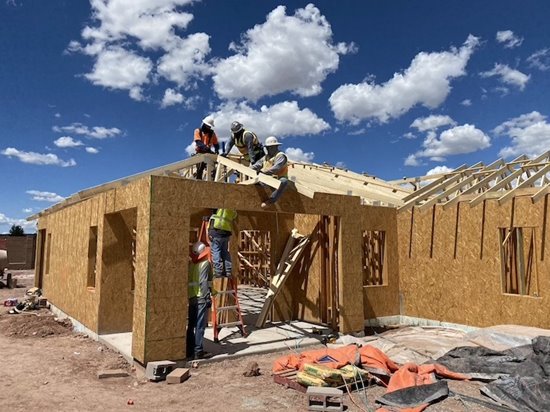 The pandemic hit the Navajo Nation hard. Because of that, some suppliers worried, especially early on, about making deliveries to the Nation, which encompasses 27,000 square miles in Northwestern New Mexico, Northeastern Arizona and Southeastern Utah. Because the area is remote – a round-trip delivery from Phoenix can take more than eight hours; roundtrip from Albuquerque can take six – some suppliers included a hefty surcharge. And so Wood makes some of those deliveries himself, to stretch dollars and enable funding to continue toward NPH's goal of helping build resilient, self-reliant communities.
The pandemic hit the Navajo Nation hard. Because of that, some suppliers worried, especially early on, about making deliveries to the Nation, which encompasses 27,000 square miles in Northwestern New Mexico, Northeastern Arizona and Southeastern Utah. Because the area is remote – a round-trip delivery from Phoenix can take more than eight hours; roundtrip from Albuquerque can take six – some suppliers included a hefty surcharge. And so Wood makes some of those deliveries himself, to stretch dollars and enable funding to continue toward NPH's goal of helping build resilient, self-reliant communities.
Wood has COVID-19 statistics. But those statistics, he reminds, are people. On Nov. 30, the Navajo Department of Health reported a total of 16,427 confirmed cases of COVID-19. Wood estimates that more than 9% of Navajo tribal members living on the reservation have been infected. There have been 653 deaths. The Navajo Nation reported 650 new cases over the weekend, he says. "And it's going to be another week before we know what's happened because of the holidays."
The statistics don't include Navajos who live off reservation. "Everywhere I turn, someone has recently lost a member of their family or knows someone who has. It's staggering," Wood says. "It's a very frightening disease."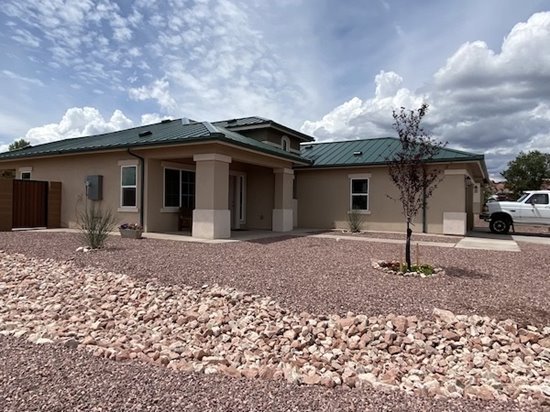
It's hit his staff hard, too, he says. "We'd implemented very strict protocols." But in spite of all of the precautions and personal protective equipment, "in spite of constant social distancing, using disinfectant and sprays and gloves and masks and lockdowns," the pandemic reached their offices. "All it takes is one person to break protocol. It's real."
Meanwhile, on the reservation, residents face furloughs. Businesses are closed. There are weekend curfews and lockdowns. "For a while, the whole city of Gallup was quarantined," Wood says. With all the lost income, NPH is helping with debt consolidation and financial support of up to $15,000. "We hope this offers a lifeline to reduce the monthly debt burden," he says.
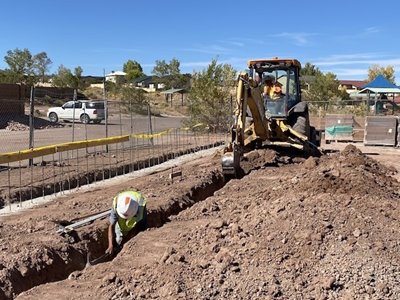 And NPH continues to build homes, providing crews with sanitizer, masks and disposable gloves, and sending workers home if someone in their family has been exposed to COVID-19. At the office, everyone is masked and at a distance. "Every day you're in a degree of paranoia, which I believe is appropriate in this environment," Wood says.
And NPH continues to build homes, providing crews with sanitizer, masks and disposable gloves, and sending workers home if someone in their family has been exposed to COVID-19. At the office, everyone is masked and at a distance. "Every day you're in a degree of paranoia, which I believe is appropriate in this environment," Wood says.
Funding from a Critical Relief Fund from NeighborWorks America, in partnership with the Wells Fargo Foundation, allowed NPH to buy technology for remote learning, communication technology, personal protective equipment, software upgrades and more. "Computer upgrades allow us to communicate with technology without it freezing up," says Wood, who works 14-hour days. "In a remote area, the WiFi can be limited and if you have aging equipment, you can be in a conversation and it will lock up and freeze you out." The $16,350 in funds helped them operate safely.
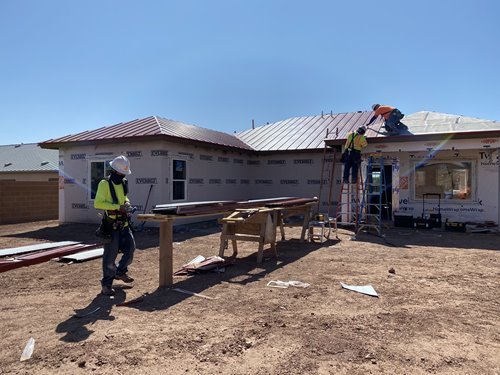 Getting people into homes to alleviate overcrowding has been essential, Wood says. Many organizations have provided services to help, from food to cleaning supplies. More than 30% of the homes on the reservation don't have running water, Wood says. "We're grateful as a community that so many people have been able to help.”
Getting people into homes to alleviate overcrowding has been essential, Wood says. Many organizations have provided services to help, from food to cleaning supplies. More than 30% of the homes on the reservation don't have running water, Wood says. "We're grateful as a community that so many people have been able to help.”
He's especially grateful to Trellis, a NeighborWorks organization that gathered supplies for a local women and children's shelter run by United Way. "I can't thank them enough to doing what they could," Wood says. "Often when people go to the shelter, they only have the clothes on their backs." Phoenix, where Trellis is based, has a large Native population, Wood says. And the two organizations "understand one another; we care about one another.”
"We wanted to make sure we could contribute," says Patricia Garcia-Duarte, president and CEO of Trellis, adding that the state of Arizona is home to 22 tribes. "This was a small way we were able to help our sister-agency and our fellow Native brothers and sisters.”
Garcia-Duarte says contributions came from staff, from board members, from friends and neighbors. "We know the community up there has been hit very hard by COVID-19. There are such limited resources up there,"she says. "There were so many items on the list.”
Trellis narrowed it down and with the help of board member Kate Wells obtained hundreds of items – soap, sanitizer, toothpaste and toothbrushes. Garcia-Duarte and some friends also contributed women's hygiene projects. "It was so exciting to see all of the donations pour in," she says.
Wood and his daughter came by the Trellis office and picked up the supplies in his truck, which has racked up the miles during the pandemic. He passed it off to the United way in a truck-to-truck transfer, he says.
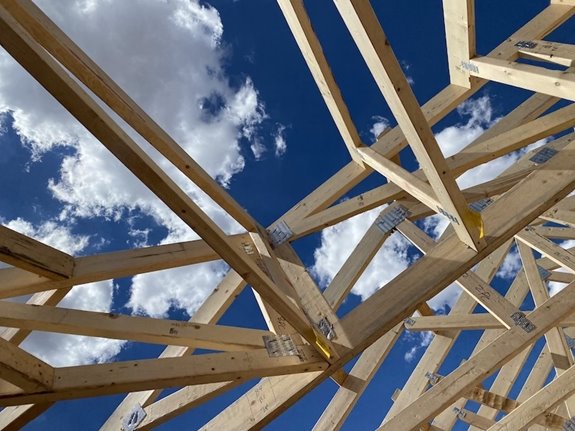 Trellis, meanwhile, is also in a community that has been a coronavirus hot spot. "I personally know of folks infected by the virus," Garcia-Duarte says. Trellis serves Maricopa County, the fourth largest county in the country in terms of population. The city of Phoenix provided millions through the Coronavirus Aid, Relief, and Economic Security (CARES) act, and Trellis is one of the organizations working hard to dispense that funding and help.
Trellis, meanwhile, is also in a community that has been a coronavirus hot spot. "I personally know of folks infected by the virus," Garcia-Duarte says. Trellis serves Maricopa County, the fourth largest county in the country in terms of population. The city of Phoenix provided millions through the Coronavirus Aid, Relief, and Economic Security (CARES) act, and Trellis is one of the organizations working hard to dispense that funding and help.
"We're all working through this,"she says. "Hopefully in another year, we'll all be reflecting back and thinking, ‘Oh my gosh. We survived it!'”
The need, Wood says, seems endless. The median income in the Navajo Nation is $20,000 a year for individuals; $22,000 for families. That's less than half of the median income for the surrounding states. "This forces overcrowding in homes, because you have to come together to pool your resources so you can simply survive. The need for safe, healthy housing has never been more obvious than it is now, during the time of pandemic. If you send someone home here, and they're going into a home with seven or eight other people, it's just going to spread like wildfire.”
NPH continues to pursue housing that can accommodate multiple generations. Staff quarantines when necessary, and forges ahead when all is clear. Wood says that while there is some despair in the community, there is also much resiliency, and people moving into new homes or modifying their loans and feeling like they have a chance to move forward. "We have to continue to build as many homes as we can. We need to continue to work to create healthy living conditions."
Wood says the region will be struggling with these issues for a long time. But there are also people who will continue to help with these issues, like NPH and other NeighborWorks organizations.
Read more about partnerships between NeighborWorks and Native organizations:
- A new way of looking at housing in rural Alaska
- Village of the Cousins in Califorina
- 'Home is the community you belong in'

